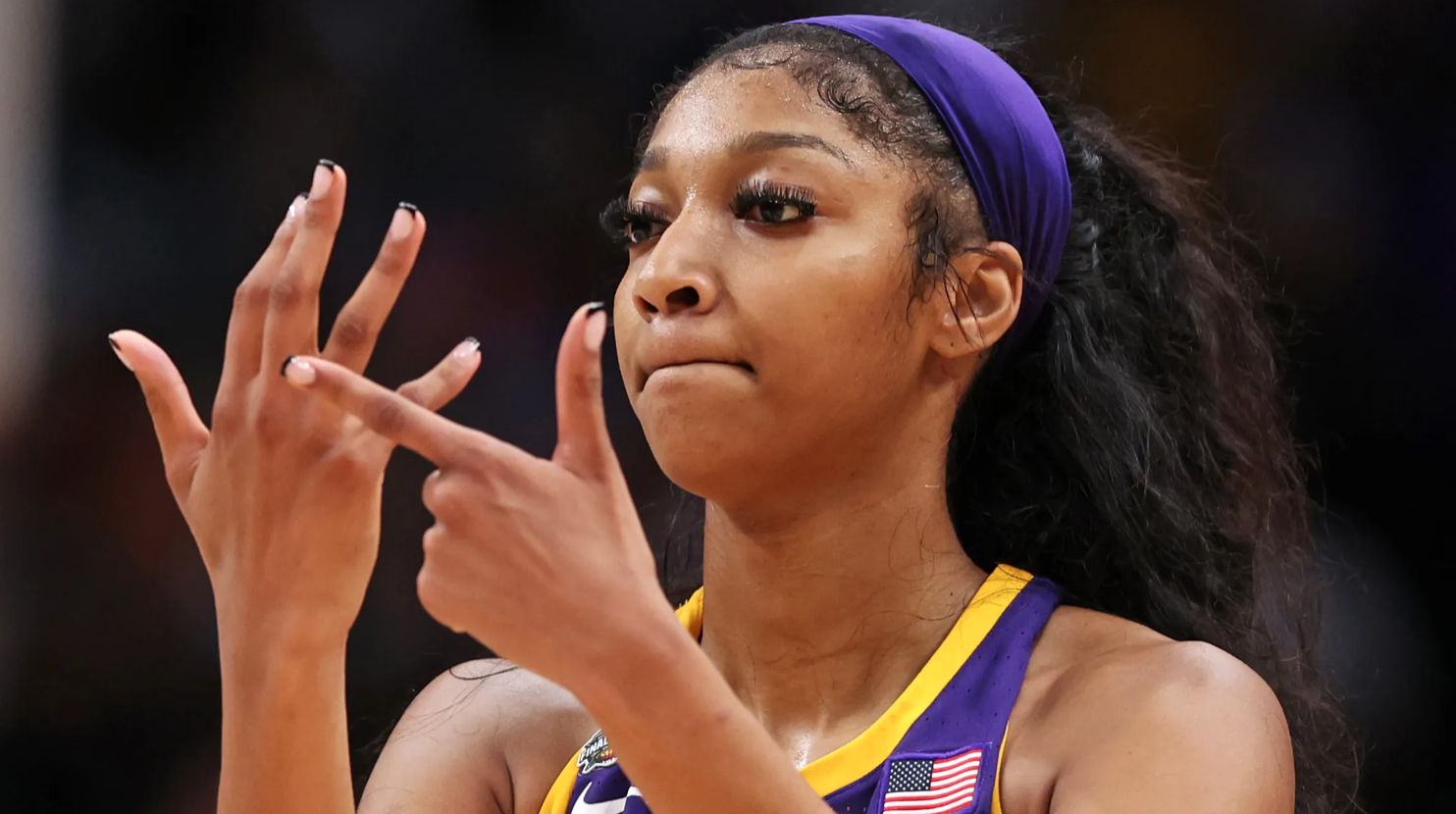LSU forward Angel Reese recently spoke out against racist social media harassment. Photo courtesy of Getty Images.
LEAH OLLIE | MANAGING EDITOR | lollie@butler.edu
Overtime, or “OT”, is an opinion column series where the Collegian takes national sports headlines or polarizing topics and gives them a Butler-centric angle.
As the hype of March Madness draws to a close, many college athletics fans are left chasing the high of a pristine bracket — or drowning the shame of a broken one. Despite the usual emotional highs and lows of a typical tournament season, one consistent undertone has dribbled its way to the forefront of fan culture: racism.
As much as some fans may like to believe it, collegiate sports and fan communities that surround one’s favorite teams do not exist in a vacuum; a multi-billion dollar industry will inevitably be influenced by the culture, history and people who have shaped it. Scholars, critics and commentators have long highlighted the racial dynamics of the sports industry, both on a collegiate and professional level. For better or worse, the talent and athleticism of people of color — specifically Black people — has majorly contributed to the success and wealth of many modern sports teams and paved a visible path for massive success for particularly gifted athletes.
For Black student-athletes on the elevated national stage, every aspect of their performance and identity is up for scrutiny like that of a celebrity. Their academic institutions may also contribute to the pressure they face while offering little defense or mental health support. Even in competitive environments where they are expected to thrive and perform to perfection, Black athletes are not protected from the racism directed towards themselves and their teammates, as was the case of the University of Utah’s women’s basketball team. Just this March, the team faced hate crimes and anti-Black slurs outside of their NCAA-chosen hotel while traveling for tournament games in Idaho.
An alarming amount of racism directed towards collegiate athletes comes directly from within their own fanbases, as so-called “fans” feel a sense of entitlement to express their vitriol as a twisted form of criticism or support. Considering the NCAA’s status as an organization that profits off of the labors and talents of its Black athletes, the combined racial and economic dynamics that surround said athletes create potential for exploitation and anti-Blackness to fester. This system has even been likened to “modern-day slavery” by some athletes.
To tie these patterns of racist vitriol back to March Madness, anti-Black posts including death threats towards LSU women’s basketball star Angel Reese reached a fever pitch of national recognition. After a year of intense social media harassment following her 2023 NCAA National Championship win, Reese shed light on the hate and its lasting effects on her mental health in a tearful press conference following LSU’s recent Elite Eight loss to Iowa.
“I’ve seen so much,” Reese said. “I’ve been attacked so many times [with] death threats. I’ve been sexualized. I’ve been threatened … I don’t really get to speak out on things because I just ignore. I just try to stand strong.”
Layers of bias and bigotry that combine racism and sexism against Black women — defined as misogynoir — resulted in social media outrage at every aspect of Reese’s identity both as a human and an athlete. Reese’s nails, eyelashes, mannerisms and outright pride in her talent were described by racist viewers and fans as “hood,” “ghetto,” “rude,” “cocky” and a variety of other targeted insults.
Such criticisms are usually defined by their double standard, as they are rarely directed towards white or male athletes, even when both share the same gestures perceived as “rude” when a Black woman performs them. These comments also build upon and perpetuate harmful stereotypes that paint Black women as more aggressive or violent than their non-Black peers, a false image that expands beyond college sports and into many facets of society.
The pressure to stay strong in the face of the overwhelming harassment Reese describes is an unfortunately widespread experience for many Black athletes. Such harassment is often compounded by less overt microaggressions, which may not explicitly reveal their racist implications but often seem well-meaning at face value.
Subtle comments about Black athletes’ appearances, style, vernacular or other expressions of their identity may often be brushed off as “fan talk,” but carry significant weight when considering the historical politics of how Black bodies and Black culture are policed in sports and forced to assimilate to a white standard. While some Black athletes continue to face bans from participating in their sports because of hair discrimination, even the most well-meaning jokes and snide comments about their hair fall flat — with absolutely no humor.
Furthermore, fans have no personal proximity to the players they gossip about; their opinions and feelings about their braids or locs or accent while speaking bear no significance or importance to athletes, and indicate the implicit attitude of entitlement over Black bodies that society and sports fan culture has normalized.
With countless examples both within and outside of collegiate athletics, the responsibility for eliminating racial harassment from fans and spectators lies both on the NCAA and educational institutions to call it what it is and stand behind their athletes as humans, rather than just economic assets. This responsibility also lies on sports media outlets and commentators, who must confront their own biases in order to ensure that equitable coverage of all athletes remains a standard for their own journalistic ethics.
The excitement and pride that college sports generate for fans is an incredible thing to witness and has become a phenomenon that brings people together for great joy and celebration. In order to keep fan culture and collegiate athletics a safe and encouraging environment for all, we must address and combat the racism that pervades it on all levels — from the couch where you sit to watch the game, to the arena where your home team plays it.



